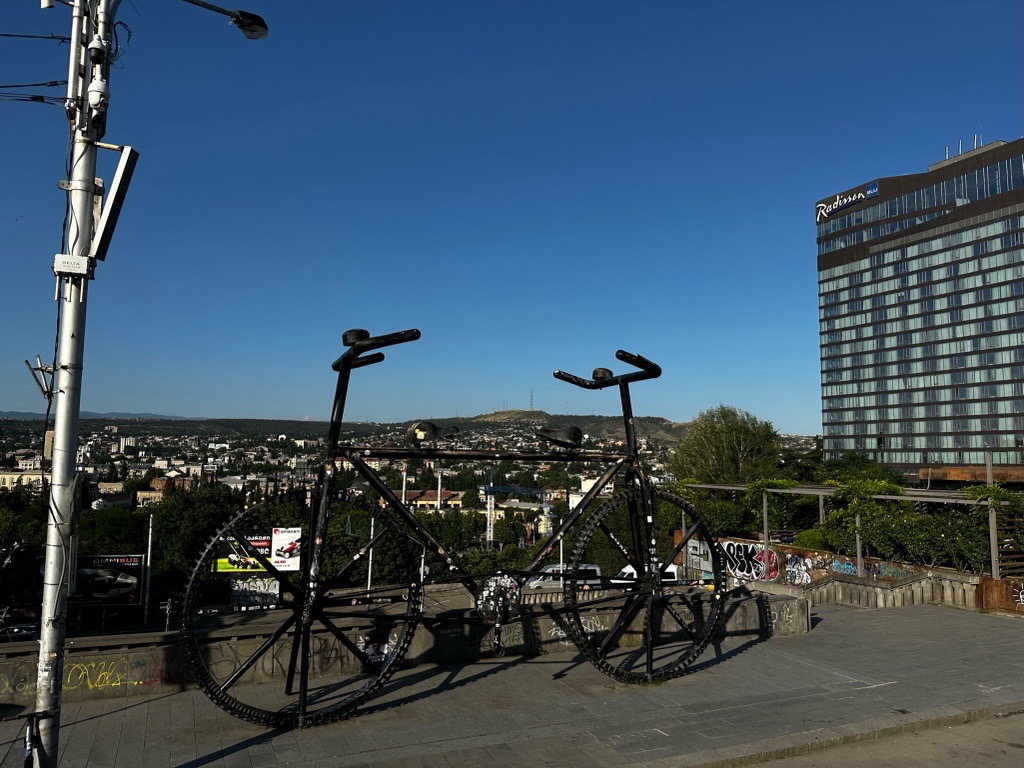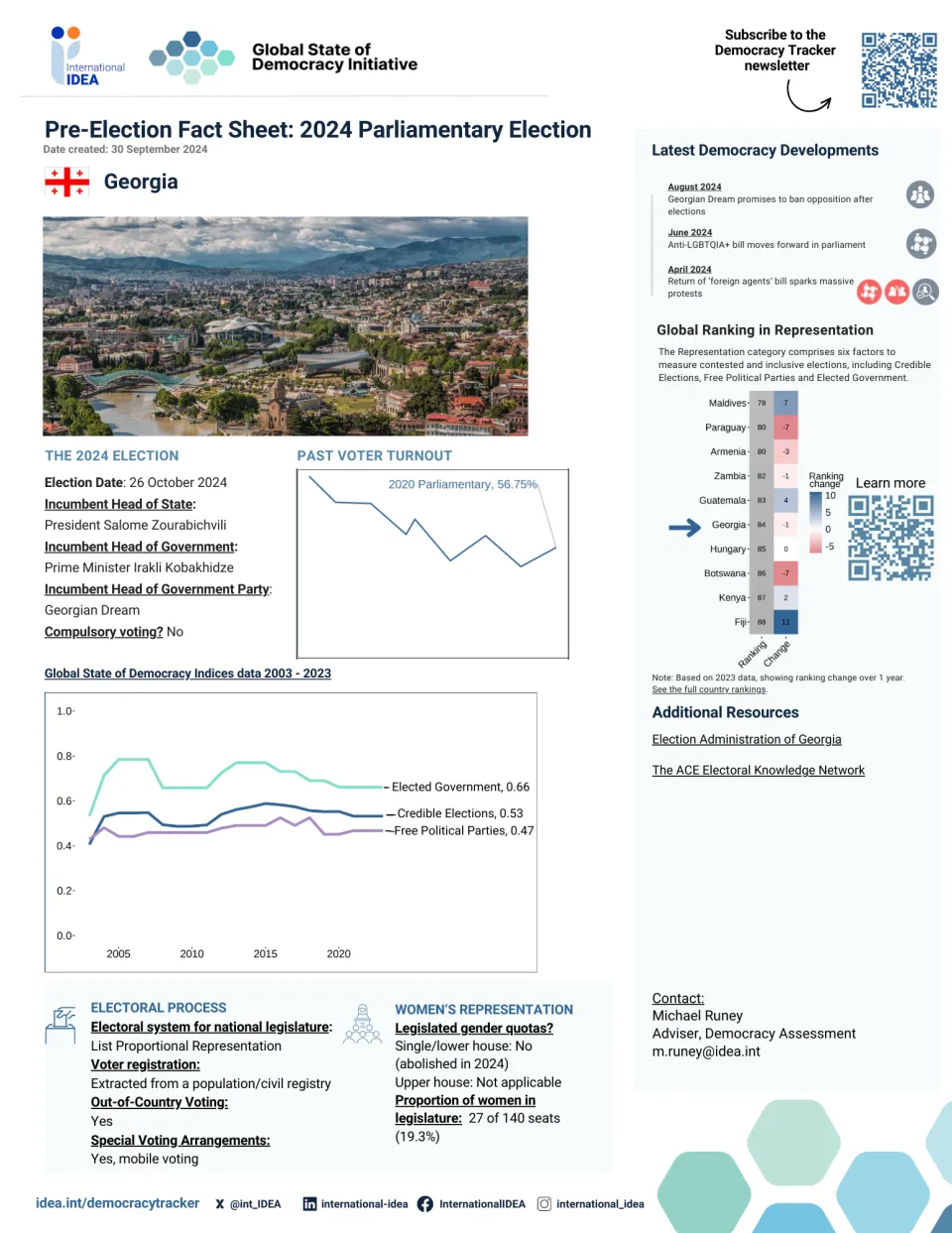
Georgia
Georgia exhibits mid-range performance across all Global State of Democracy (GSoD) categories of democracy. It ranks in the top 25 per cent globally in Absence of Corruption, and over the past five years, it has experienced significant declines in six factors, including Credible Elections, Civil Society, and Civil Liberties Some of these concerns are due to heavy-handed repression of anti-government protesters and civil society as well as hostile environment for media. Following the dissolution of the Soviet Union, Georgia endured years of political instability and a severe economic collapse, but is now an upper-middle-income country and mid-performing democracy. Historically, much of Georgian public policy was oriented towards obtaining membership in NATO and the European Union, but in recent years the ruling Georgian Dream has backtracked on both goals. Economically, Georgia is dependent on remittances from the 23 per cent of the labor force that works outside the country.
Georgia is overwhelmingly composed of ethnic Georgians (86 per cent or the population), but has sizable Azerbaijani, Armenian, Abkhaz, Ossetian and other smaller minorities. Ethnic minorities’ grievances in the early years of independence strengthened separatist Abkhaz and Ossetian movements, leading to the Georgian Civil War (1991-1993). Russia intervened on behalf of Abkhaz and Ossetian separatists, and the war ended after the displacement of roughly 300,000 people -- primarily ethnic Georgians -- from the self-declared and largely unrecognized Republics of Abkhazia and South Ossetia. Then in 2008, Russia baited an incautious Georgian President Mikheil Saakashvili into providing an excuse to launch a full-scale war, which resulted in Russia establishing de facto control over both separatist republics and displacing an additional 135,000 Georgians and Ossetians. As of 2024, about 299,000 Georgians (eight per cent of the population), are registered as internally displaced people, and hold an uncertain place in Georgian society.
Georgian politics have been dominated by the ruling Georgian Dream party, which has controlled the parliament and nearly every municipal government continuously since defeating Saakashvili’s United National Movement in 2012. Since then, Bidzina Ivanishvili, who is the head of the UNM and Georgia’s richest man, has been Georgia’s de facto ruler, despite having only intermittently held office. Although the parties have historically largely agreed ideologically, identity-based polarization has become intense in recent years, and Georgian Dream’s formal ‘pause’ of European Union accession in 2024 was met with widespread protests. Simultaneously, the government has moved to severely restricted media, opposition political party and civil society freedom through direct prosecutions and by cutting off sources of nongovernmental funding.
Georgia performs in the mid-range on Gender Equality and elected its first woman president in 2018. However, women’s and LGBTQIA+ rights have suffered under Georgian Dream’s restrictions of rights and liberties; parliament repealed a 2020 gender quota in 2024 and LGBTQIA+ people are officially portrayed as an unwanted Western import.
Having abandoned the broadly popular goal of EU membership, Georgia’s trajectory in the next five years will be determined by how far Georgian Dream takes its authoritarian turn and reorientation towards Russia. Moves to single out critical journalists for prosecution and shutter media outlets entirely means it Freedom of Expression and the Media may be at risk, and efforts to politicize the civil service may indicate further declines in Predictable Enforcement.
Updated: May 2025
https://www.idea.int/democracytracker/
August 2025
NGO crackdown continues with bank account freezes
The Georgian government froze seven leading civil society organizations’ (CSO) bank accounts on 27 August, as part of anti-corruption and tax inspections it has undertaken on nearly every high-profile CSO in the country since the country’s Foreign Agent Registration Act came into effect in June. The freezes are part of a case alleging the CSOs are engaged in ‘sabotage’ by allegedly purchasing protective materials for anti-government protesters and paying arrested protesters’ fines and legal fees. In statements, the affected CSOs denied the charges and said the protective materials in question were purchased for their own staff, as their mandate as human rights monitors required them to monitor protests. In March 2025, the Prosecutor General’s Office froze the bank accounts of other CSOs that had financially supported protesters, but has not yet provided any evidence to support the current charges.
Sources: Eurasianet, OC Media, International IDEA
May 2025
Georgian Dream steps up pressure on opposition parties
The ruling Georgian Dream party escalated its efforts to ban and sideline opposition politics parties in May. Three opposition leaders were sentenced to pre-trial detention and Parliament (boycotted by the opposition) passed a law simplifying the process and expanding the criteria for banning political parties. Zurab Japaridze, Irakli Okruashvili and Nika Gvaramia were arrested for declining to appear before a parliamentary committee tasked with investigating alleged crimes of the former United National Movement (UNM) government (2004-2012). The committee’s stated goal is to find grounds to ban UNM and all other opposition parties. Many opposition figures have refused the committee’s summons, arguing that the committee’s aims are unconstitutional and that because the 2024 parliamentary elections lacked credibility, the current Parliament is illegitimate. If convicted of failing to comply with the summons, all three face up to one year in prison and a three-year ban from holding public office.
Update: Zurab Japaridze and two other opposition politicians were sentenced to eight months in prison on 23 June for failing to comply with the parliamentary committee’s summons. Japaridze and Mamuka Khazaradze and Badri Japaridze (no relation) of Lelo Party were also banned from holding public office for two years. Five other opposition politicians are still awaiting sentencing.
Sources: OC Media (1), OC Media (2), OC Media (3), Parliament of Georgia, International IDEA, Civil.ge
April 2025
Series of laws close civic and media space
Parliament passed several laws restricting civil society and media on 1 April, including a so-called “foreign agents” law (FARA) imposing sweeping registration requirements and sanctions on independent organisations and media outlets. The law tightens regulation on broadcasters and revokes a requirement to involve civil society in the legislative process. On 17 April it passed a law mandating prior permission from the Georgian Anti-Corruption Bureau to receive a grant from any foreign donor. The Georgian FARA law requires any organisation or individual deemed to be acting at the direction of a foreign power, including receiving a grant, to register with the government or face up to five years’ imprisonment. Broadcasters are now subject to stricter state ‘coverage standards’ and banned from foreign funding, which journalists say amounts to state control and censorship. The law on civil society participation was justified by what Georgian Dream lawmakers called the ‘anti-democratic’ actions of NGOs.
Sources: OC Media (1), Caucasian Knot, OC Media (2)
January 2025
Watchdogs say media executive's arrest was unwarranted
A leading media executive was sentenced to pre-trial detention on 12 January while she faces trial for slapping a police officer during an argument outside of a police station. Mzia Amaghlobeli, the founder of Georgian media outlets Netgazeti and Batumelebi, was arrested during a protest against the Georgian government’s repressive response to nationwide protests in December and January. Georgia’s media community, 14 embassies, the EU Human Rights Commissioner, and international politicians have called for Amaghlobeli to be released while she awaits trial, arguing her detention is without legal basis and intended to punish her for her media outlets’ investigations into human rights abuses and official corruption. The arrest comes as part of a wider crackdown on media and protest, including police violence, that has been criticized by international and domestic human rights monitors and press freedom organizations. As of 6 February, Amaghobeli had been on a hunger strike protesting her continued pre-trial detention for 25 days.
Update: Amaghobeli was sentenced to two years’ imprisonment on 6 August. The initial charge of assaulting a police officer, which carried a minimum sentence of four years imprisonment, was downgraded to resisting arrest by the presiding judge. International and domestic human rights and press freedom groups condemned the sentence as unwarranted and politically motivated.
Sources: Eurasianet (1), Eurasianet (2), OC Media, Interpress, BBC, Committee to Protect Journalists, Batumelebi
See all event reports for this country
Global ranking per category of democratic performance in 2024
Basic Information
Human Rights Treaties
Performance by category over the last 6 months
Blogs
Election factsheets
Global State of Democracy Indices
Hover over the trend lines to see the exact data points across the years
Factors of Democratic Performance Over Time
Use the slider below to see how democratic performance has changed over time

